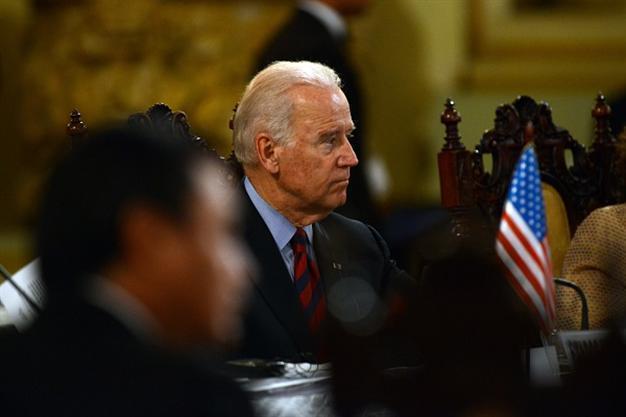PM Erdoğan and US Vice President Biden agree on unified gov't in Iraq
ANKARA / WASHINGTON

US Vice-President Joe Biden, is seen during a bilateral meeting at Culture Palace in Guatemala City on June 20, 2014. AFP PHOTO Johan ORDONEZ
Turkish Prime Minister Recep Tayyip Erdoğan and U.S. Vice President Joe Biden agreed on the necessity of the formation of a unified government in Iraq during a phone conversation on June 23.
The talks come at a time when Iraqi Kurds are moving away from Baghdad, as the Islamic State of Iraq and the Levant (ISIL) threat continues.
Erdoğan and Biden exchanged views on the latest developments in Iraq and agreed on the prompt formation of a national consensus government in order to protect Iraq’s territorial integrity and political union and to achieve success in its fight against terror, Turkish officials said, according to Anadolu Agency.
Concerned over Iraq being drawn into a sectarian conflict, Erdoğan and Biden underscored that the national consensus government should embrace all Iraqi citizens and give Sunni Muslims a chance to be represented again.
They also discussed the ongoing efforts to ensure the safe return of the Turkish nationals seized in the restive country, said the Turkish Prime Ministry’s office.
In the meantime, Prime Minister Erdoğan and his British counterpart David Cameron also exchanged a phone call June 23 to discuss the developments in Iraq in light of the growing concerns caused by ISIL.
The two leaders agreed on the need to establish a unified government in Iraq to end the ongoing political instability. Erdoğan also called on the European Union to be more active in resolving the problem in Iraq.
Meanwhile, the White House said Biden and Erdoğan both deplored the actions of the al-Qaida-inspired ISIL. Biden also called for Turkish nationals, as well as the other hostages to be released immediately.
Militants affiliated with ISIL abducted 49 people from the Turkish consulate in the flashpoint city of Mosul on June 11, one day after seizing 31 Turkish truck drivers.
Iraq has seen a marked increase in sectarian violence between Sunni and Shiite Muslims in the recent months, which the Iraqi government blames on ISIL.
ISIL, which already controls parts of Syria, has had its reach extended into Iraq since June 10, when it seized Iraq’s second-largest city, Mosul, and captured a number of other cities in the north, including Tikrit and Telafer. They also reportedly control al-Qaim, Rawah, Anah, al-Ratba and Haditha in the western province of al-Anbar.
ISIL forces also extended their grip along Iraq’s Syrian and Jordanian border on June 23 after taking control of border crossings, according to Farhan Ftikhan, the mayor of al-Qaim.
Around one million civilians have been displaced so far amid the ongoing clashes in the country.
Kirkuk Governor considers ‘Biden scenario’
Biden also spoke with Bahrain’s King Hamad bin Isa al-Khalifa, a Sunni, regarding the developments in Iraq. Bahrain, like Iraq, is a majority-Shiite country. The White House says Biden and the king agreed Iraq’s leaders must set aside sectarianism to confront the ISIL threat.
“I think the only hope to keep the country together is probably through a confederation of three different regions,” Kirkuk provincial Governor Najm al-Din Karim told Agence France-Presse (AFP). “This is actually what Biden suggested in 2004, and everybody thought he was breaking up Iraq, but that’s the only way and he was right.”
In that scenario, he insists, Kirkuk’s residents would choose to be part of the Kurdish region.
“The people of Kirkuk will vote for a place [where] there’s peace, where they can have services,” he says.
“They know the Kurdistan region is where they can get these things.”
Part of Kirkuk’s allure lies in the vast oil reserves in the province.
Karim will not be drawn on the future of the reserves, saying it is an issue to be worked out later, but Kurdish residents of Kirkuk are less equivocal.
“The rights to Kirkuk’s oil are shared between the Kurdish government and the central government, but the government abandoned the situation, abandoned the region and abandoned the people,” says 28-year-old construction worker Ithar Subhan.
“They lost their rights [to the oil] when the Iraqi army left, when they failed to carry out their duties.”
‘Independent Kurdistan’ debate
Masoud Barzani, president of the Kurdistan Regional Government (KRG), told CNN International on June 23 that “Iraq is obviously falling apart.”
Barzani had told Sky News Arabia TV on April 8 that an independent Kurdish state is to be established, pointing out that they are moving towards a confederation with Iraq.
“The Kurds of Iraq can decide for themselves the name and type of the entity they are living in,” Hüseyin Çelik, a spokesperson for Turkey’s ruling Justice and Development Party (AKP), reportedly told the Kurdish online news outlet Rudaw last week.
U.S. Senate Majority Leader Harry Reid applauded “Turkey’s move to welcome an independent Kurdistan on its border” on June 19.
